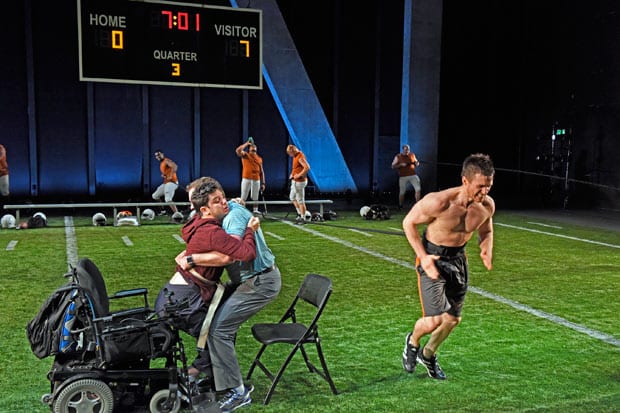DTC’s premiere production of ‘Colossal’ boldly storms past the goal line in its complex exploration of masculinity

TAKE A KNEE | Mike (Zack Weinstein, left) struggles to adjust following a paralyzing football injury while memories of his younger self (Alex Stoll, right) haunt him in the sports-meets-memory play ‘Colossal.’ (Photo courtesy Karen Almond/DTC)

ARNOLD WAYNE JONES | Executive Editor
The curtain doesn’t so much rise on Colossal — the world-premiere play now at the Dallas Theater Center — as the game clock starts ticking … literally. They don’t even open the doors to the Potter Rose performance hall until start time, as audience members scramble to their open seating, traipsing across the AstroTurf while the cast of uniformed football players run drills and a drumline beats out fight songs as the scoreboard counts down from 15:00 until game tim… er, I mean the performance.
Of course, it’s all performance, from the seating to the “halftime” (no intermission, but an interlude that combines athleticism, music and dance) to the action that tells a surprisingly intimate story in the vast open hall. “Sporting event” and “theater” have never melded so beautifully, so effortlessly. Indeed, it almost feels unfair to try to separate the two.
Andrew Hinderacker, who wrote Colossal, seems to understand both disciplines equally well. The football jargon, dynamics, physicality, camaraderie are sweated authentically from the characters, primarily Mike (portrayed as a fit younger version by Alex Stoll and as a paralyzed older version by quadriplegic actor Zack Weinstein) and Marcus (Khris Davis), his co-captain on the UT Longhorns gridiron squad. But Mike and Marcus aren’t just teammates; they share an even more intimate bond of genuine erotic love. (It’s a homophobe’s nightmare-turned-reality: Locker-room romance!)
But Hinderacker just as ably knows theatrical traditions; Colossal has the feel of a memory play like Death of a Salesman, as the action toggles nimbly between present and past, between reality and a gauzy recollection wrapped in shadow and POV. What happened during that fateful game that snapped Mike’s vertebrae? What happened in that hotel room during the away game? And how do men — physical, inarticulate, slaves to preconceptions of masculinity — end up expressing themselves?
There’s more than a smattering of symbolism in this production, directed by Kevin Moriarty with a steely sense of portend. You can sit just feet from the actors as they scrimmage with bone-crunching verisimilitude. (Moriarty also makes rare use of the theater’s usually-shaded glass walls to bring the outside inside.) There’s a definite homoeroticism evoked watching this fit cast of all men play grab-ass and execute plays with balletic elegance.
But Colossal isn’t a mawkish romance set in the world of sports; it would be as reductive and dismissive to call it “the gay football play” as it was to call Brokeback Mountain “the gay cowboy movie.” Hinderaker aims for something more universal about what it means to be a man. I imagine he might have even worked his way backward from the injury — what could cause a skilled athlete to forget his training and do something reckless? — to derive the love story. He finds the mirrored ways men talk to each other in different contexts (saying “I got you” as both a promise of teamwork and an offer of emotional support) and how fathers and sons, and lovers, struggle to portray their feelings.
The cast is a powerful mix; Stoll, as the fully fit version of Mike, acts as a kind of ghost taunting (and perhaps motivating) his injured Doppelganger, giving Weinstein the more internal, stunted role. His reconciliation with his father (Joel Ferrell) is exquisitely tender in its wordless surrender and rawness. The team comprises an admixture of actors, dancers and athletes who create a kind of Greek chorus that reminds us not only of the fragility of the human body but its impressive capacity as well.
I’ve heard that during one scene — emotionally intimate but not sexually explicit — some members of preview audiences walked out. It’s a shame their intolerance blinded them to the greater message of the play: the conundrums that linger between the moments we think are living — between expectation vs. fact, between desire vs. reality, between words vs. deeds. As Jerry (Steven Michael Walters), Mike’s gay physical therapist observes, he treats a half-dozen different football veterans for a variety of debilitating injuries, and yet “every Saturday, I’m in those stands, and every Sunday I’m in front of my TV.” The paradoxes, there and elsewhere, are simply colossal.
This article appeared in the Dallas Voice print edition April 17, 2015.

